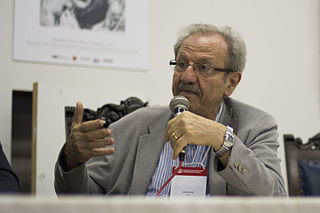Ergodic theory is a branch of mathematics that studies statistical properties of deterministic dynamical systems; it is the study of ergodicity. In this context, "statistical properties" refers to properties which are expressed through the behavior of time averages of various functions along trajectories of dynamical systems. The notion of deterministic dynamical systems assumes that the equations determining the dynamics do not contain any random perturbations, noise, etc. Thus, the statistics with which we are concerned are properties of the dynamics.

Jacob Palis Jr. is a Brazilian mathematician and professor. Palis' research interests are mainly dynamical systems and differential equations. Some themes are global stability and hyperbolicity, bifurcations, attractors and chaotic systems.

Yakov Grigorevich Sinai is a Russian–American mathematician known for his work on dynamical systems. He contributed to the modern metric theory of dynamical systems and connected the world of deterministic (dynamical) systems with the world of probabilistic (stochastic) systems. He has also worked on mathematical physics and probability theory. His efforts have provided the groundwork for advances in the physical sciences.

The Instituto Nacional de Matemática Pura e Aplicada is considered to be the foremost research and educational institution of Brazil in the area of mathematics. It is located in the city of Rio de Janeiro, and was formerly known simply as Instituto de Matemática Pura e Aplicada (IMPA), whose abbreviation remains in use.
In mathematics, ergodicity expresses the idea that a point of a moving system, either a dynamical system or a stochastic process, will eventually visit all parts of the space that the system moves in, in a uniform and random sense. This implies that the average behavior of the system can be deduced from the trajectory of a "typical" point. Equivalently, a sufficiently large collection of random samples from a process can represent the average statistical properties of the entire process. Ergodicity is a property of the system; it is a statement that the system cannot be reduced or factored into smaller components. Ergodic theory is the study of systems possessing ergodicity.

William Parry FRS was an English mathematician who worked in dynamical systems, and, in particular, ergodic theory. In particular, he studied subshifts of finite type nilflows.

Mahendra G. Nadkarni is a professor emeritus at University of Mumbai. Nadkarni obtained his Ph.D. in mathematics from Brown University, the US in 1964 for his work on Ergodic theory. His research interests include Ergodic Theory, Harmonic Analysis, and Probability Theory.

Artur Avila Cordeiro de Melo is a Brazilian and naturalized French mathematician working primarily in the fields of dynamical systems and spectral theory. He is one of the winners of the 2014 Fields Medal, being the first Latin American and lusophone to win such award. He has been a researcher at both the IMPA and the CNRS. He has been a professor at the University of Zurich since September 2018.

Elon Lindenstrauss is an Israeli mathematician, and a winner of the 2010 Fields Medal.

Jean-Pierre Eckmann is a Swiss mathematical physicist in the department of theoretical physics at the University of Geneva and a pioneer of chaos theory and social network analysis.

Mikhail (Misha) Lyubich is a mathematician who has made important contributions to the fields of holomorphic dynamics and chaos theory.

Marcelo Miranda Viana da Silva is a Brazilian mathematician working in dynamical systems theory. He proved the Zorich–Kontsevich conjecture together with Artur Avila.
Ricardo Mañé Ramirez was a Uruguayan mathematician, known for his contributions to dynamical systems and ergodic theory. He was a doctoral student of Jacob Palis at IMPA.
Carlos Gustavo Tamm de Araújo Moreira is a Brazilian mathematician working on dynamical systems, ergodic theory, number theory and combinatorics. Moreira is currently a researcher at the Instituto Nacional de Matemática Pura e Aplicada (IMPA), where he goes by the nickname "Gugu". He is also a member of the Brazilian Mathematical Olympiad Commission, a fanatic fan of the Brazilian football team Flamengo and a member of the Brazilian Communist Party (PCB). In October 2016, he achieved the mark of 5000 goals scored in his amateur football career. He maintains a record of his goals to show to the incredulous.
Jorge Manuel Sotomayor Tello was a Peruvian-born Brazilian mathematician who worked on differential equations, bifurcation theory, and differential equations of classical geometry.

Lai-Sang Lily Young is a Hong Kong-born American mathematician who holds the Henry & Lucy Moses Professorship of Science and is a professor of mathematics and neural science at the Courant Institute of Mathematical Sciences of New York University. Her research interests include dynamical systems, ergodic theory, chaos theory, probability theory, statistical mechanics, and neuroscience. She is particularly known for introducing the method of Markov returns in 1998, which she used to prove exponential correlation delay in Sinai billiards and other hyperbolic dynamical systems.
The Michael Brin Prize in Dynamical Systems, abbreviated as the Brin Prize, is awarded to mathematicians who have made outstanding advances in the field of dynamical systems and are within 14 years of their PhD. The prize is endowed by and named after Michael Brin, whose son Sergey Brin is a co-founder of Google. Michael Brin is a retired mathematician at the University of Maryland and a specialist in dynamical systems.

Federico Rodríguez Hertz is an Argentine mathematician working in the United States. He is the Anatole Katok Chair professor of mathematics at Penn State University. Rodriguez Hertz studies dynamical systems and ergodic theory, which can be used to described chaos's behaviors over the large time scale and also has many applications in statistical mechanics, number theory, and geometry.
Shen Weixiao is a Chinese mathematician, specializing in dynamical systems.
In the mathematical discipline of ergodic theory, a Sinai–Ruelle–Bowen (SRB) measure is an invariant measure that behaves similarly to, but is not an ergodic measure. In order to be ergodic, the time average would need to be equal the space average for almost all initial states , with being the phase space. For an SRB measure , it suffices that the ergodicity condition be valid for initial states in a set of positive Lebesgue measure.












